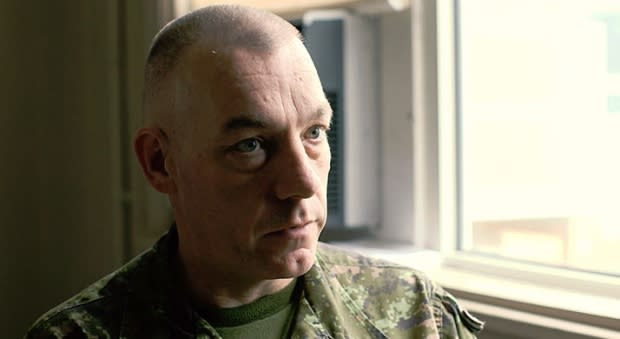Edmonton soldier reunites with Bosnian boy he saved decades ago
Over the years, Maj. John McDougall often thought about the Bosnian boy he found lying on the train tracks, covered in electrical burns.
Now, thanks to social media, McDougall has reconnected with the man whose life he saved more than 20 years ago.
This summer, the Edmonton military medic and his former patient, Asmir Ramic, shared a tearful reunion in a London hotel lobby.
"There was not a single word spoken," McDougall, 51, said in an interview with CBC Radio's Edmonton AM. "We just walked up to each other and hugged, hugged and hugged for about five minutes."
Through his 30-year career medical career with the Canadian Armed Forces, McDougall had never experienced anything like it.
"As with every military operation, when you leave you expect that you're not going to hear anything more about the people," he said. "To have him reach out and actually find me, that's pretty powerful."
He hit his head on the overhead wire and took 30,000 volts. - Maj. John McDougall
The pair first met in 1997, during McDougall's first overseas deployment.

Then a master corporal, McDougall was in Bosnia-Herzegovina participating in Operation Palladium, a NATO peacekeeping mission in the aftermath of the Bosnian War.
As a senior medic, McDougall was stationed at a platoon house with a small group of soldiers in the village of Kulen Vakuf.
Most of the town had been evacuated. Many houses had been destroyed during the brutal conflict.
One day, a child banged on the door of the platoon house and told the group, through a translator, that there was an emergency.
Ramic, then 14, had been playing on top of a train when he came into contact with a live wire.
"He hit his head on the overhead wire and took 30,000 volts, so it threw him off the top of the train," McDougall said. "But his foot got caught on the railing."
The live wire knocked Ramic unconscious and singed his flesh. His down-filled vest had exploded.
"We went up the road and found this kid hanging upside down, with feathers everywhere, and unconscious," McDougall said. "You could see some of the burns on his face and his hands."

McDougall thought the boy would not survive.
The soldiers rushed Ramic to a hospital in the town of Bihac, a 30-minute drive away.
It took him months to recover. He had first-, second- and third-degree burns on his shoulder, down his arm and across his face.
He remembers slipping in and out of consciousness inside the armoured ambulance that took him to hospital, but has no other memory of the accident.
Ramic's family was "remarkably grateful" McDougall said. The medic was "unofficially adopted" by Ramic's mother, who often invited him and other soldiers over for freshly brewed tea and homemade baklava.
Ramic was his family's only surviving child. His older brother, Admir, had been killed in the conflict.
"It was a year after the war stopped, that I got hit by electricity, so you can imagine the amount of shock my mother had when she realized I could die too," Ramic said.
He credits McDougall with saving his life.
"I wouldn't be alive, I wouldn't have married, I wouldn't of had my children," he said. "I am a happy man, and without John I wouldn't be here today."
The friend request

McDougall often thought of the "little brother" he helped in Bosnia but never thought they would reconnect.
The country remained dangerously unstable. The occasional letter was their only correspondence for years.
Then about six years ago, McDougall got a friend request on Facebook.
It was Ramic, looking to reconnect.
Now grown, he was working with the United Nations and had a wife and growing family. He had never forgotten the soldier who carried him to safety.
They began regular correspondence and were finally able to meet again after Ramic, now 36, began working as a teacher in London, England, where a family vacation took McDougall in late June.
I made a difference in one person's life on that tour. And that's enough. - John McDougall
"I think to say emotional would be an understatement," McDougall said of the reunion. "I was pacing like an expectant father in the hotel lobby, waiting to see him show up."
Ramic hopes to one day visit McDougall's family in Edmonton.
"It was a really emotional, touching moment," he said. "I wish I could have spent more time with him, because we have so many other stories to share with each other.
The encounter has reaffirmed McDougall's passion for medicine and his confidence in Canada's role in peacekeeping.
"We do make a difference — even if it's in one person's life," he said.
"I made a difference in one person's life on that tour. And that's enough to give me the motivation to keep doing what we do, and to believe in what we do."

